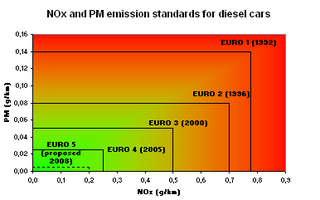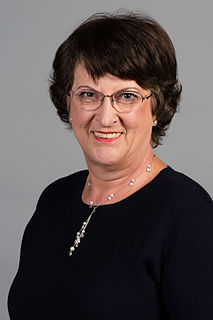Environment of the European Union :
Environment of the European Union :
A report from the European Environment Agency shows that road transport remains Europe's single largest air polluter. [1]
National Emission Ceilings (NEC) for certain atmospheric pollutants are regulated by NECD Directive 2001/81/EC (NECD). [2] As part of the preparatory work associated with the revision of the NECD, the European Commission is assisted by the NECPI working group (National Emission Ceilings – Policy Instruments). [3]
Directive 2008/50/EC of the European Parliament and of the Council of 21 May 2008 on ambient air quality and cleaner air for Europe (the new Air Quality Directive) has entered into force on 11 June 2008. [4]
Individual citizens can force their local councils to tackle air pollution, following an important ruling in July 2009 from the European Court of Justice (ECJ). The EU's court was asked to judge the case of a resident of Munich, Dieter Janecek, who said that under the 1996 EU Air Quality Directive (Council Directive 96/62/EC of 27 September 1996 on ambient air quality assessment and management [5] ) the Munich authorities were obliged to take action to stop pollution exceeding specified targets. Janecek then took his case to the ECJ, whose judges said European citizens are entitled to demand air quality action plans from local authorities in situations where there is a risk that EU limits will be overshot. [1]
The best available technology or best available techniques (BAT) is the technology approved by legislators or regulators for meeting output standards for a particular process, such as pollution abatement or pasteurization. Similar terms are best practicable means or best practicable environmental option. BAT is a moving target on practices, since developing societal values and advancing techniques may change what is currently regarded as "reasonably achievable", "best practicable" and "best available".

European emission standards define the acceptable limits for exhaust emissions of new vehicles sold in the European Union and EEA member states. The emission standards are defined in a series of European Union directives staging the progressive introduction of increasingly stringent standards. The final standard is Euro 7, which will be followed by phase-out of fossil fuel vehicles.

Directive 2008/1/EC of the European Parliament and of the Council of 15 January 2008 concerning integrated pollution prevention and control is a directive of the European Union. It replaces the Council Directive 96/61/EC of 24 September 1996 on the same subject matter; both are commonly referred to as IPPC Directive.

The Landfill Directive, more formally Council Directive 1999/31/EC of 26 April 1999 is a European Union directive that regulates waste management of landfills in the European Union. It was implemented by its Member States by 16 July 2001.
The Waste Incineration Directive, more formally Directive 2000/76/EC of the European Parliament and of the Council of 4 December 2000 on the incineration of waste, was a Directive issued by the European Union and relates to standards and methodologies required by Europe for the practice and technology of incineration. The aim of this Directive is to minimise the impact of negative environmental effects on the environment and human health resulting from emissions to air, soil, surface and ground water from the incineration and co-incineration of waste. The requirements of the Directive were developed to reflect the ability of modern incineration plants to achieve high standards of emission control more effectively. The Directive was replaced by the Industrial Emissions Directive with effect from 7 January 2014

Directive 2003/30/EC is a European Union directive for promoting the use of biofuels for EU transport. The directive entered into force in May 2003, and stipulates that national measures must be taken by countries across the EU aiming at replacing 5.75% of all transport fossil fuels with biofuels by 2010. The directive also called for an intermediate target of 2% by 31 December 2005. The target of 5.75% is to be met by 31 December 2010. The percentages are calculated on the basis of energy content of the fuel and apply to petrol and diesel fuel for transport purposes placed on the markets of member states. Member states are encouraged to take on national "indicative" targets in conformity with the overall target.

Although the European Union has legislated in the area of energy policy for many years, the concept of introducing a mandatory and comprehensive European Union energy policy was only approved at the meeting of the informal European Council on 27 October 2005 at Hampton Court. The EU Treaty of Lisbon of 2007 legally includes solidarity in matters of energy supply and changes to the energy policy within the EU. Prior to the Treaty of Lisbon, EU energy legislation has been based on the EU authority in the area of the common market and environment. However, in practice many policy competencies in relation to energy remain at national member state level, and progress in policy at European level requires voluntary cooperation by members states.
The role of incineration of waste and equipment used for it has changed radically in the recent years. While they were formerly notorious as pollutant spewing technical monsters in the eyes of citizens' groups, nowadays, thermal waste treatment facilities are considered to be the essential pillars of sustainable, forward-looking recycling and raw material sectors.

The European Data Protection Supervisor (EDPS) is an independent supervisory authority whose primary objective is to ensure that European institutions and bodies respect the right to privacy and data protection when they process personal data and develop new policies.

Air pollution is the presence of substances in the atmosphere that are harmful to the health of humans and other living beings, or cause damage to the climate or to materials. There are different types of air pollutants, such as gases, particulates, and biological molecules. Air pollution may cause diseases, allergies and even death to humans; it may also cause harm to other living organisms such as animals and food crops, and may damage the natural or built environment. Both human activity and natural processes can generate air pollution.
To protect the environment from the adverse effects of pollution, many nations worldwide have enacted legislation to regulate various types of pollution as well as to mitigate the adverse effects of pollution.
The 1999 Gothenburg Protocol to Abate Acidification, Eutrophication and Ground-level Ozone is a multi-pollutant protocol designed to reduce acidification, eutrophication and ground-level ozone by setting emissions ceilings for sulphur dioxide, nitrogen oxides, volatile organic compounds and ammonia to be met by 2010. As of August 2014, the Protocol had been ratified by 26 parties, which includes 25 states and the European Union.

Catherine Zena Bearder is a British Liberal Democrat politician who served as Leader of the Liberal Democrats in the European Parliament between 2 July 2014 and 12 November 2019. She was a Member of the European Parliament (MEP) for South East England from 4 June 2009 to 31 January 2020.
System of Environmental-Economic Accounting (SEEA) is a framework to compile statistics linking environmental statistics to economic statistics. SEEA is described as a satellite system to the United Nations System of National Accounts (SNA). This means that the definitions, guidelines and practical approaches of the SNA are applied to the SEEA. This system enables environmental statistics to be compared to economic statistics as the system boundaries are the same after some processing of the input statistics. By analysing statistics on the economy and the environment at the same time it is possible to show different patterns of sustainability for production and consumption. It can also show the economic consequences of maintaining a certain environmental standard.

Seb Dance is a British Labour Party politician who served as a Member of the European Parliament (MEP) for the London region from 2014 to 2020. He was Vice-Chair of the European Parliament Committee on the Environment, Public Health and Food Safety (ENVI) and sat on the European Parliament Committee on Industry, Research and Energy (ITRE), as well as the European Parliament Committee on Agriculture and Rural Development (AGRI). In his first mandate he also sat on the European Parliament Committee on Development (DEVE).
Ambient air quality criteria, or standards, are concentrations of pollutants in the air, and typically refer to outdoor air. The criteria are specified for a variety of reasons including for the protection of human health, buildings, crops, vegetation, ecosystems, as well as for planning and other purposes. There is no internationally accepted definition but usually "standards" have some legal or enforcement aspect, whereas "guidelines" may not be backed by laws. "Criteria/criterion" can be used as a generic term to cover standards and guidelines.
Since the late 1970s, the European Union's (EU) policy has been to develop and drive appropriate measures to improve air quality throughout the EU. The control of emissions from mobile sources, improving fuel quality and promoting and integrating environmental protection requirements into the transport and energy sector are part of these aims.
Air pollution in Germany has significantly decreased over the past decade. Air pollution occurs when harmful substances are released into the Earth's atmosphere. These pollutants are released through human activity and natural sources. Germany took interest in reducing its greenhouse gas (GHG) emissions by switching to renewable energy sources. Renewable energy use rose from 6.3% in 2000 to 34% in 2016. Through the transition to renewable energy sources, some people believe Germany has become the climate change policy leader and renewable energy leader in the European Union (EU) and in the world with ambitious climate change programs, though Germany's CO2 emissions per capita are in fact among the highest in Europe, almost twice those of e.g. France. The current goal of the German government was approved on 14 November 2016 in the German Climate Action Plan 2050, which outlines measures by which Germany can meet its greenhouse gas emissions by 2050. By 2050, Germany wants to reduce their GHGs by 80 to 95% and by 2030 they want to reduce it by 55%, compared to the EU target of 40%.
Directive 2008/50/EC, or the Ambient Air Quality Directive, is an EU directive which limits sulphur dioxide, NO2 and other oxides of nitrogen, particulate matter (PM10, PM2,5), lead, benzene and carbon monoxide emissions from 2010. Hourly average emissions of NO2 are limited 200 μg/m3 and yearly to 40 μg/m3. As of 2018 several EU member states are being sued for violating the limits: France, Spain, Italy, Hungary, Romania, Slovakia, the Czech Republic, the United Kingdom and Germany.